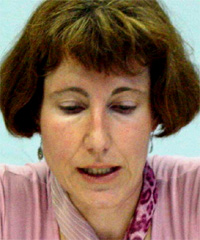










Alex Smith
Amanze Akpuda
Amitabh Mitra
Ando Yeva
Andrew Martin
Aryan Kaganof
Ben Williams
Bongani Madongo
Chielozona Eze
Chris Mann
Chukwu Eke
Chuma Nwokolo
Colleen Higgs
Colleen C. Cousins
Don Mattera
Elizabeth Pienaar
Elleke Boehmer
Emilia Ilieva
Fred Khumalo
Janice Golding
Lebogang Mashile
Manu Herbstein
Mark Espin
Molara Wood
Napo Masheane
Nduka Otiono
Nnorom Azuonye
Ola Awonubi
Petina Gappah
Sam Duerden
Sky Omoniyi
Toni Kan
Uzor M. Uzoatu
Valerie Tagwira
Vamba Sherif
Wumi Raji
Zukiswa Wanner
![]()
Credits:
Ntone Edjabe
Rudolf
Okonkwo
Tolu Ogunlesi
Yomi Ola
Molara Wood
![]()
 |
||||
|
Photograph: Mai Palmberg/ Britain/Zimbabwe
Society. |
||||
| AW Online Guest: Elleke Boehmer | ||||
Elleke Boehmer is
busy. Her bibliography says so. A scholar-writer's career is in
business if apart from the obligatory teaching and research, and
creative and critical writing, and any number of literary festivals,
conferences, seminars and lecture tours, it also engages activism
of the kind that has sometimes seen her move into key policy making
and implementation roles in arts administration and development,
finding time too to judge literary competitions. Our brief online
encounter also had to do with staying focused, being busy. With
an already packed 2007 schedule she was still able to see through
two publications, which will be out in 2008. The two books are Nile
Baby, “ a novella set in Britain but with a strong
African subtext”. It is being published by Ayebia Books Ltd,
the Oxfordshire based company. Another Oxfordshire publisher, this
time Oxford University Press, is bringing out Boehmer’s second
2008 publication, Nelson Mandela: A Very Short Introduction,
offered as an “iconographic study of Mandela… as national
hero and myth.”
How does this University of Oxford scholar, biographer and novelist blend or bleed all that writing, thinking and work out of one life? This was surely the first of many human interest stories we might have asked, just adequate for the light holiday reading of some African Writing fans in distant Cape Town, South Africa, or closer to our base in Oxford, England. But we were only a moment away from deadlines and production. So we chose to do the serious stuff. We asked more questions about her new publications, and then towards the end tried to get a free comment on contemporary African writing from Boehmer, who is a Professor of World Literature in English and a noted scholar in Colonial and Postcolonial Studies:
Elleke Boehmer: In Nile Baby, two twelve-year-old children, Alice Khan and Arnie Binns, stumble upon the deep-seated presence of Africa in Britain. In an old laboratory attached to their school they find an ancient preserved foetus and set out on a journey that takes them to Leeds and Heathrow to return it to its rightful home. On their journey they repeatedly discover how Africa is embedded in the heart of England, in similar ways to how Europe’s dreams were often said to be invested at the heart of Africa.
Elleke Boehmer:: There will be plenty of new material. In fact I would say that my Very Short Introduction: Nelson Mandela will offer an unprecedented take on the man and the myth! The book is essentially an iconographic study of Mandela, that is, it looks at Mandela as a symbol, as a dream and as a global ethical presence: how has Mandela figured not only in the struggle against apartheid, but also in people’s imaginations. In particular the study examines Mandela in his roles of performer, guerrilla, prisoner-gardener, and statesman, and looks closely at his humanism – a humanism based on reciprocity and understanding. I contend that his is essentially and radically an African humanism. In the colonial era the human was defined in opposition to and rejection of Africa. Mandela shows in contrast that his Africanness guarantees his humanness. This may represent the link with my other book, Nile Baby: both books look at the intensely African dimensions of the human.
Elleke Boehmer:: I’m excited
about the new diasporic architecture of African Literature –
as represented by Chimamanda Adichie, for example. On occasion African
literary study still becomes bogged down in a restless quest for
authenticity (understandable as this is). To me African writers
are citizens of international spaces, as well as of Africa: they
belong to the world. |
||||

